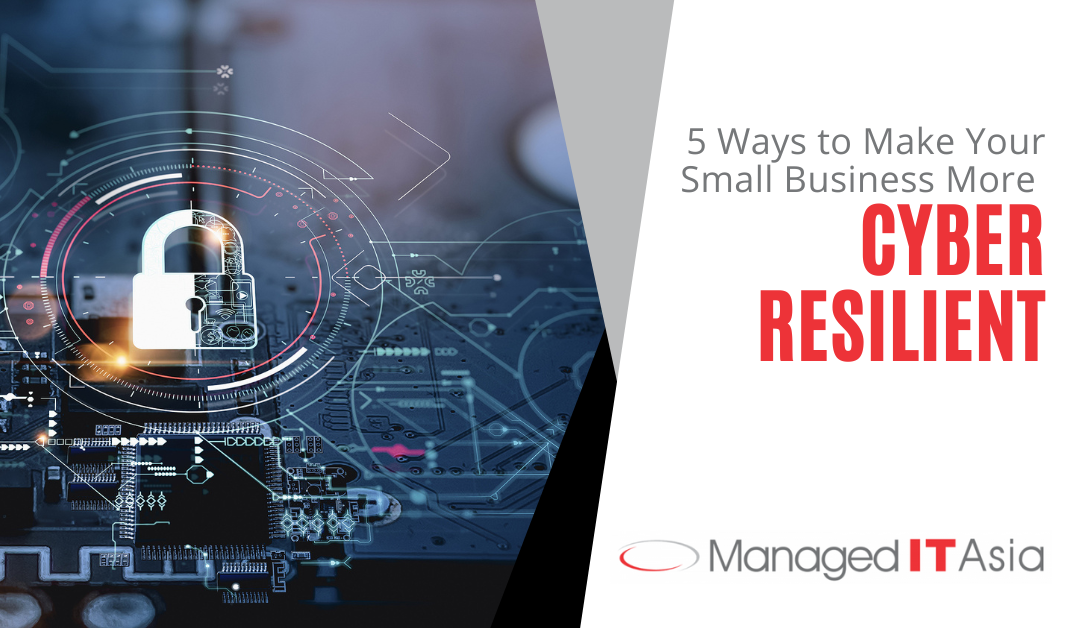Small businesses attract cybercriminals because they are generally known to have weaker cybersecurity levels than larger enterprises, which makes it easier to sabotage their data. Just like natural disasters, the scope and damage of cybercrime are increasing. These cybercriminals are more insidious and craftier. They strike without warning, which leaves their victims little time to mitigate their impact. In the past year, 42 percent of small businesses fell victim to cyberattacks. Cyber resilience is the strength to recover and return to normalcy from an unforeseen incident from cybercriminals like ransomware or a phishing attack. As a small business owner, prioritizing cyber resilience is paramount especially if your business relies on data access. Imagine your employees are unable to access data due to a cyberattack. That will result in more loss than you can imagine. There isn’t a particular method for managing cyber risks because cyber threats constantly evolve. The specific risk tolerance and exposures of each business should guide its cybersecurity strategies. In light of that, there are five practical ideas small business owners can use to increase their cyber-resilience without breaking the bank.
How Can a Small Business Owner Be More Cyber Resilient?
Here are practical ways small business owners can make their businesses more cyber-resilient:
Create a penetration testing program
The penetration testing program is the act of using ethical hacking and a penetration testing tool. Furthermore, a penetration testing tool can assist in automating specific tasks, boost testing efficacy, and discover problems that may be hard to find using manual assessment strategies. Hiring cybersecurity professionals, also known as ethical hackers, is an important step to take. The authorized attempt to break and obtain unauthorized access to a company’s computer system and network is referred to as ethical hacking. The term ‘ethical hack’ entails copying the techniques used by cybercriminals and malicious hackers to acquire access. Ethical hackers/ cybersecurity professionals can assist small businesses to identify any IT infrastructure vulnerabilities and security loopholes, then fix those issues before a cybercriminal can use them. Creating the penetration testing program helps to constantly improve your system’s security, reducing risk and boosting resilience.
Business stability planning
Right from the start, your business must create a business continuity strategy. That is a key step in being more cyber resilient. Since every small business ought to create a business continuity strategy, it’s possible that these businesses don’t think of employing a ‘plan of action’ in case of cyber-breach. Understanding how to deal with your system, who to notify, or whether you need to withdraw user access is crucial because when all these processes are outlined in a comprehensive business continuity strategy, you don’t hit the wall at critical moments. A call-to-action plan can make a difference between disaster and recovery in many cybersecurity incidents. Another component of being cyber-resilient is having a plan for business continuity so that you can resume operations without long delays or disruptions.
Strengthen your most vulnerable link – people
Malware continues to spread primarily through phishing attacks. Employees get tricked into downloading harmful codes using deceptive attachments, emails, and web links. It is crucial to teach employees what to look out for and the practices to avoid as malicious techniques become more advanced. Your employees need to get trained on security and IT best practices, phishing simulations, compliance requirements, data protection, and other topics through continuous cybersecurity training. These programs are specially designed to minimize the rate and risk of infections.
Keep backups in the cloud to guarantee remote data access
Maintaining backups locally speeds up data recovery in most cyberattack incidence. But it’s also crucial to store files in the cloud, which will serve as an added level of cyber resilience. Getting remote access to data has proven to be vital for maintaining business continuity with so many people working remotely. If there is ever a local network disruption or an incident at a local site, users can access data remotely thanks to the backup copies kept in the cloud. Any cyber resilience strategy must include a cloud backup system for endpoints and servers. The potential to move to the cloud has become a crucial business competency since the cloud has shown itself as an essential resource for enhancing IT resilience through adaptability.
Strong passwords
Stop wasting time thinking about how to create passwords, instead, think about how to create passphrases. Create a lengthy password by stringing four or five distinct words together. Make an effort to add some symbols and numbers. If you are using a password manager, then that will assist you in coming up with unique passwords for each account you use and even keep track of them for you. Though a lot of people dislike the concept, using a password manager is more secure than using one password for all your accounts, especially when combined with 2FA (two-factor authentication).
Boost Your Cyber Resilience with Managed IT Asia
You might be worried about the increase in devastating cyberattacks, or you might just be pressed for time due to your growing business’s demands. Whatever the cause, managed IT services can assist you in meeting your small business’s technology needs. Do you need help? Contact us!
MANAGED IT ASIA, we are an IT Support, IT Solutioning and Managed IT Service Provider specializing in serving Small Businesses across Asia. Call us at +65 6748 8776 and let us manage your Small Business IT today!
